- World map
- Demographic situation in cities
- City indicators
- The main demography indicators
- Taxes and fees
- Tax and fee rates
- Transport and rent expenses, energy consumption costs
- Transport expenses
- Real estate market
- Renewable resources
- Report on products’ seasonality
- Seasonal businesses
- The geography of agriculture business
World map of virtual economics
The world map in Virtonomics is identical to the real geographical map. The only difference is the number of available countries in Virtonomics. There are 5 countries in Intensive format and 36 in Classic mode. You can see the Virtonomics world map by clicking on «Analytics» > «Macroeconomics».
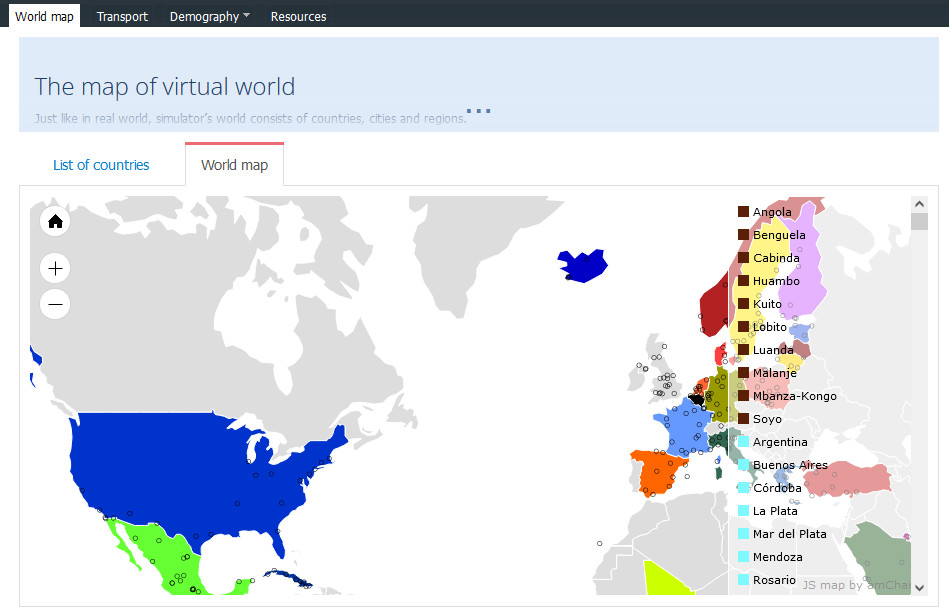
General information on the countries includes the number of cities, population, and tax rates. For detailed information on the cities (population, average salary, unemployment rate, education, etc.) select the country or a region:

Demographic situation in cities
Every city has its own demographic profile.
Employment types:
- Employees at the enterprises owned by other participants
- Employees at computer-generated enterprises
- Civil servants
- Non-working population
- Unemployed
City indicators
There is archived information on key indicators in every city:

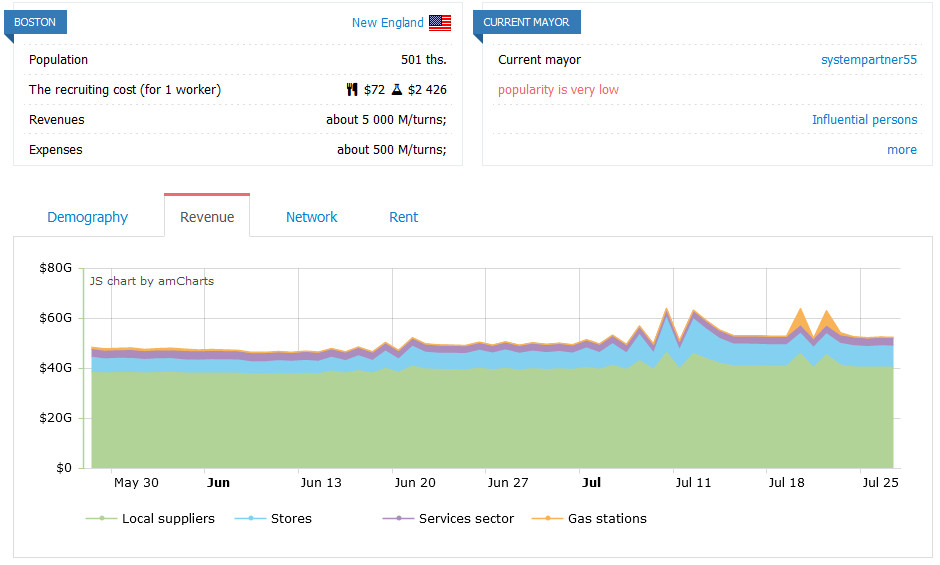
Additionally, there is data on rent costs, renewable resources (agricultural products, wood, etc.), and seasonal variations.
The main demography indicators
When selecting a city to start your business, pay attention to the following factors:
- Population — it gives an overview of the potential market size.
- Average city salary — the level is normally higher in bigger cities.
- Unemployment rate — on one hand, high unemployment reduces the market potential.
- On the other hand, the unemployed can easily become your employees.
- Education level — an abstract indication of average employee qualification in the city.
- Wealth level — an abstract indication of the population’s buying power in the city. It is a calculated correlation between the city population and the size of the retail market.
Taxes and fees
The information on the taxes and fees that are applied in Virtonomics virtual world can be found by clicking on the «Analytics» > «Macroeconomics» tab.
A sample of customs duties on export and import (select the country and click on the «Custom duties » tab):
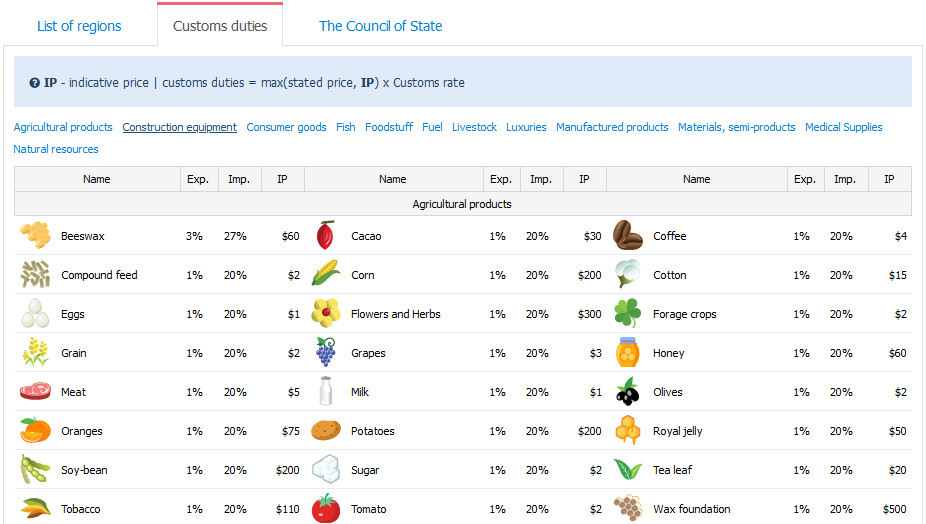
Information on the tax rates in a specific region of the country. Select the country and click on «Region».

A sample of CTIE rates (select the region and click on the «CTIE rates»):
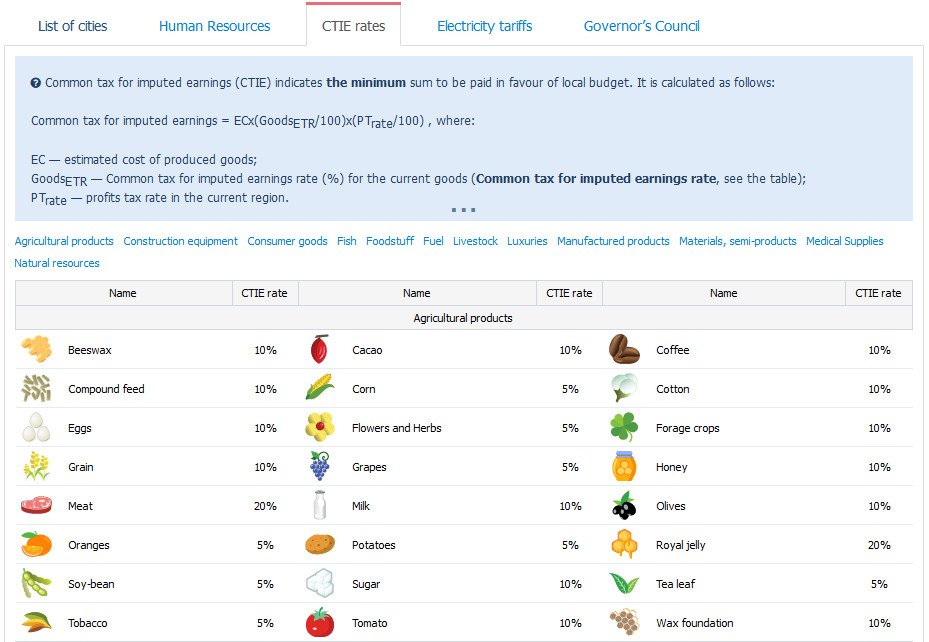
Tax and fee rates
Just like in real life, the virtual companies in Virtonomics have to pay certain taxes and fees:
- Custom duties — are applied in export and import operations. Their rates depend on the product / raw material.
- Income tax — the main tax. Applied in trading (wholesale, sales of products produced by your factories, sales in stores), and services. The income tax rates vary according to region. The dividends are transferred during the game update.
- CTIE rates — a minimum tax deduction sum; applies only to production subdivisions. It is deducted only when the products are sold at a price lower than their prime cost or if the enterprise’s income is lower than the income tax rate. In all other cases, the income tax is applicable. The tax rates vary based on region.
- Technology and licenses sales tax. 7% rate.
- Property sale tax (when selling subdivisions). 10% rate.
Transport and rent expenses, energy consumption costs
Just like in real life, the shipping of products in Virtonomics costs a certain amount of money. The information on shipping costs is available by clicking on «Analytics» > «Macroeconomics», and selecting the «Transport» tab. Select the product category and the departure city:

Energy tariffs of certain regions of the country or the whole country can be found by clicking on «Analytics» > «Macroeconomics», just select the required country or region.
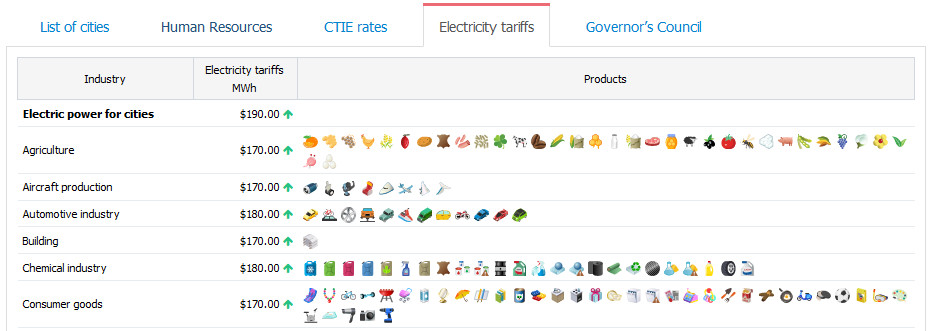
The rent costs of the cities by clicking on «Rent»:
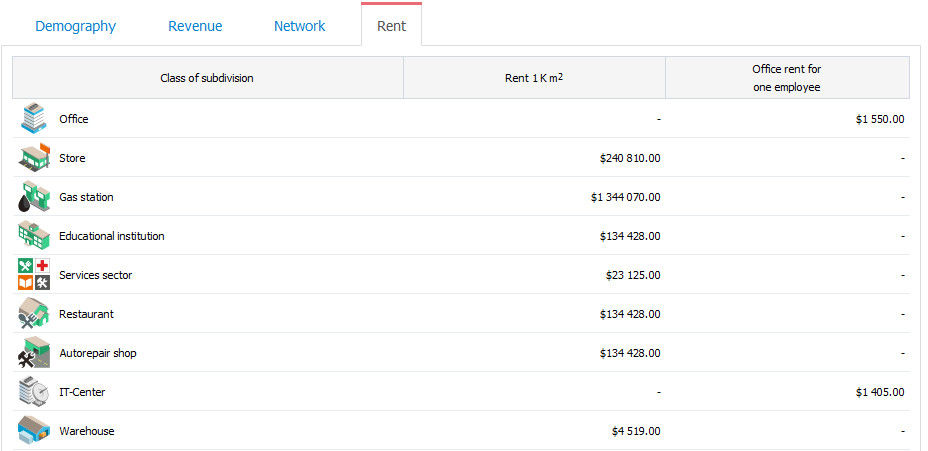
Transport expenses
In some cases, transportation expenses and customs duties can have a significant impact on the selling price of the product. For example, the manufacturer’s price of one potato is $ 0.09. The shipping of potatoes from Shanghai to Cologne and customs duties will cost $ 0.06 per potato, which is ~ 66% of the price. The selling price and the price with shipping expenses and customs duties are indicated when ordering products:
- Supplier’s price — selling price.
- The price — the total price, including transport
- expenses and customs duties.
Real estate market
Premises for offices, stores, warehouses, restaurants, hair salons, laundries, etc. are for rent. You can rent the required premises in one game turn (the actual building of the subdivisions takes longer than that).
Renewable resources
Wood, agricultural, and fishery products are renewable resources that vary according to each city. Production of certain resources does not depend on seasonal variations (wood manufacturing or pearl fishing, for example). However, the agriculture business depends heavily on seasonality.
A sample of the harvesting calendar in specific cities:
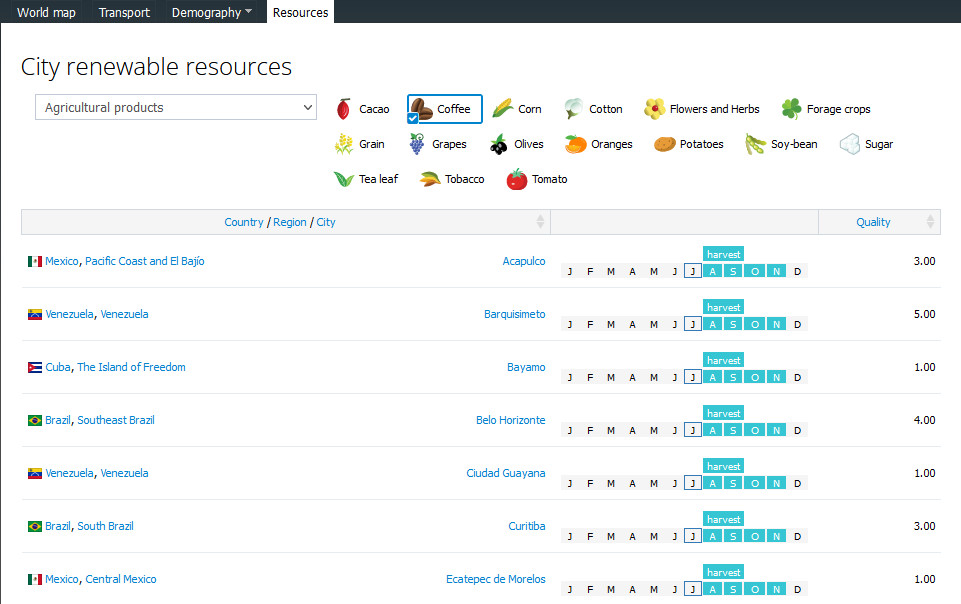
The seasonality is depicted in crop cultivation reports:
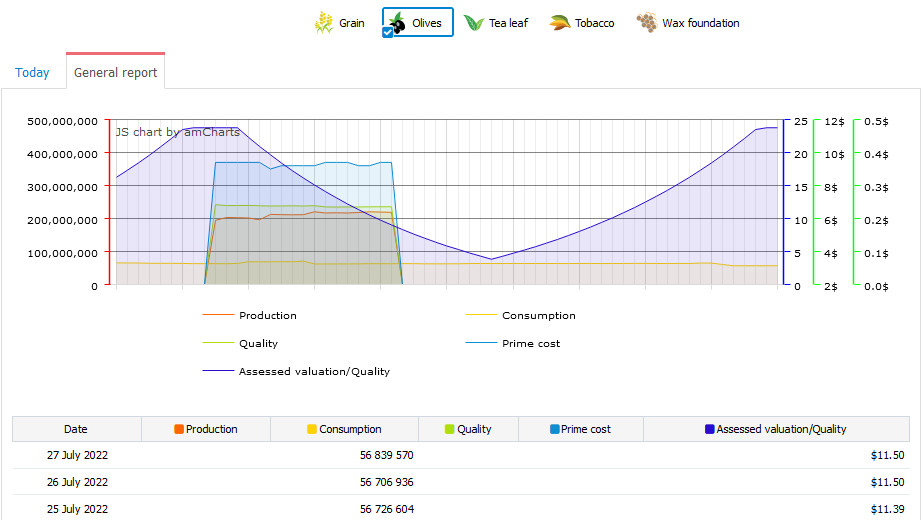
Report on products’ seasonality
For the information of the city’s renewable resources, click on «Analytics» / «Macroeconomics», and choose the «Resources» tab.
For specific reports click on «Analytics» / «Market analysis» and select the «Resources» tab.
Seasonal businesses
Agriculture businesses (farms, plantations) are actively developing only during a certain part of the game year. The seasons of sowing, ripening, and harvesting vary according to different types of crops.
When the harvest season comes to an end, the employees of the agriculture subdivision are dismissed, but general expenses are still applicable.
When you open farms, you can start the sowing process during this exact virtual year.
The geography of agriculture business
Just like in real life, growing certain crops strongly depends on geographical aspects. Each renewable resource depends on certain environmental conditions and geographical locations. (You cannot grow coffee in Norway, for instance).
 Business games
Business games  Бизнес игры
Бизнес игры  Juegos de negocios
Juegos de negocios  Geschäftsspiele
Geschäftsspiele  Jogos de negócios
Jogos de negócios  Giochi aziendali
Giochi aziendali  Jeux d'entreprise
Jeux d'entreprise  Trò chơi kinh doanh
Trò chơi kinh doanh  ألعاب الأعمال
ألعاب الأعمال  Επιχειρηματικά παιχνίδια
Επιχειρηματικά παιχνίδια  Forretningsspil
Forretningsspil  משחקי עסקים
משחקי עסקים  商业游戏
商业游戏  비즈니스 게임
비즈니스 게임  Permainan perniagaan
Permainan perniagaan  Zakelijke spellen
Zakelijke spellen  Forretningsspill
Forretningsspill  Gry biznesowe
Gry biznesowe  Jocuri de afaceri
Jocuri de afaceri  İş oyunları
İş oyunları  Liiketoimintapelit
Liiketoimintapelit  Obchodní hry
Obchodní hry  Affärsspel
Affärsspel  ビジネスゲーム
ビジネスゲーム